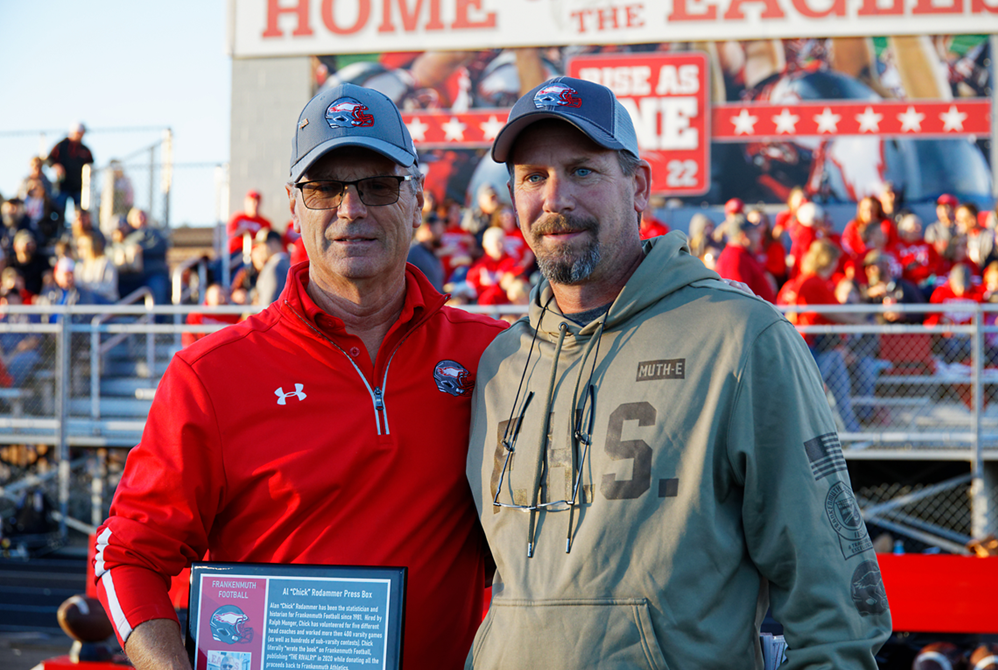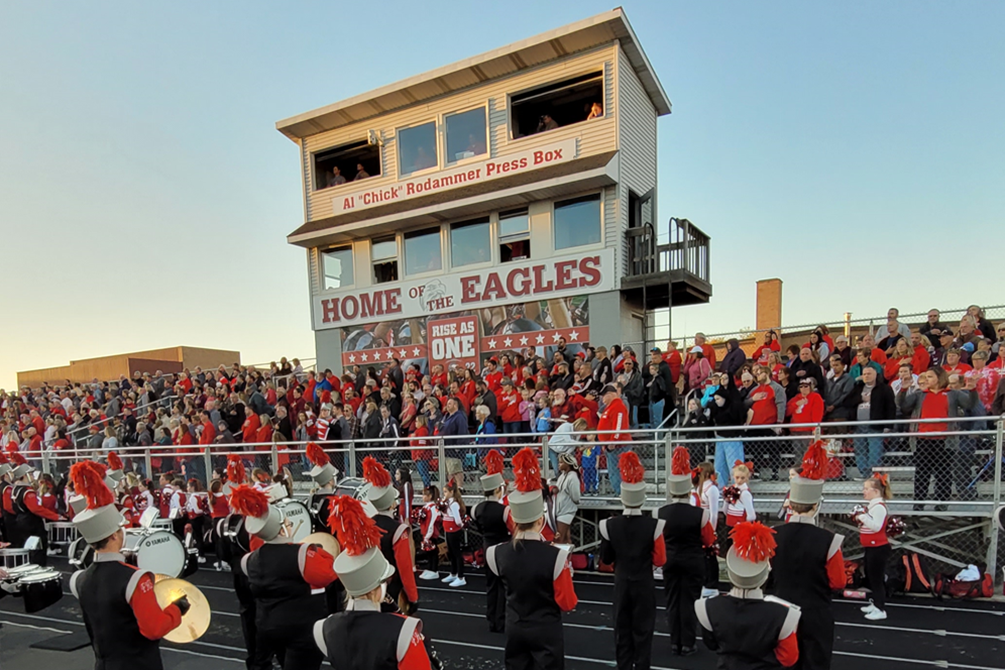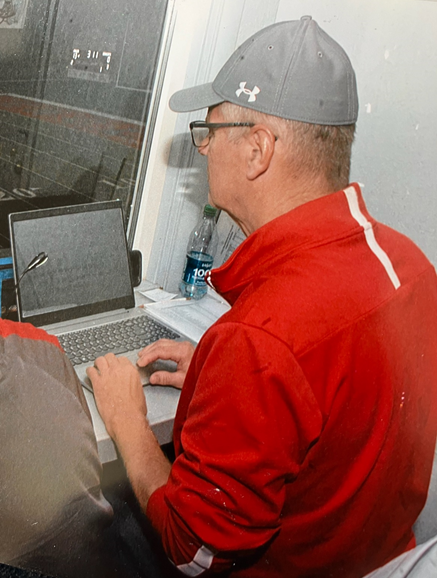
Talking Practice: Texas, Illinois Revise Policies
December 20, 2013
By Rob Kaminski
MHSAA benchmarks editor
Coaches and players in Texas and Illinois adapted to new football practice limitations this fall, with the Texas policy focusing on contact, and the Illinois regulation emphasizing length of preseason practices.
Following are the main changes those states put in place heading into the 2013-14 season:
The University Interscholastic League, which governs school sports in Texas, put into writing that, “During the regular season and postseason, no football player is allowed to participate in more than ninety (90) minutes of full contact practice per week,” effective with the first day of practice this fall.
The complete policy follows:
For the purposes of the of rule, "full contact" is defined as football drills or live game simulations where "live action" occurs. Live action, as defined by USA Football, is contact at game speed where players execute full tackles at a competitive pace taking players to the ground. A team may continue to dress in full pads for practice, but may only participate in live action drills and game time simulations no more than ninety minutes per athlete per week. It is assumed that when players are in shells (shorts, shoulder pads, and helmets) no live action drills or simulations will occur. This rule is intended to limit live action drills and simulations and not the number of practices a team may participate in full pads. A team may participate in "air," "bags," "wrap," and "thud" drills and simulations at any point. These contact levels are defined below:
• Air - Players should run unopposed without bags or any opposition
• Bags - activity is executed against a bag, shield or pad to allow for a soft-contact surface, with or without the resistance of a teammate or coach standing behind the bag.
• Wrap - Drills run at full speed until contact, which is above the waist with the players remaining on their feet.
• Thud - Same as wrap but tempo is competitive with no pre-determined winner and the players are not tackling to the ground.
 The rule came to the UIL Legislative Council as a recommendation from the UIL Medical Advisory Committee, a permanent advisory committee to the Legislative Council which meets twice each year to discuss and review safety policies for UIL participants. The committee, which is made up of leading medical professionals in various specialties and includes representatives from the Texas High School Coaches Association, the Texas Girls Coaches Association, and the Texas State Athletic Trainer Association, unanimously recommended this limitation in full-contact football practice.
The rule came to the UIL Legislative Council as a recommendation from the UIL Medical Advisory Committee, a permanent advisory committee to the Legislative Council which meets twice each year to discuss and review safety policies for UIL participants. The committee, which is made up of leading medical professionals in various specialties and includes representatives from the Texas High School Coaches Association, the Texas Girls Coaches Association, and the Texas State Athletic Trainer Association, unanimously recommended this limitation in full-contact football practice.
The rule formulates into a formal policy the existing actions of the majority of coaches across Texas, and most coaches have had to make few adjustments, if any. In fact, according to a story on statesman.com, the proposal caused more of an uproar on social media than from coaches.
“It’s not going to affect us in anyway,” Vandegrift HS coach Drew Sanders said in the story. “Most good coaches were way below that 90-minute amount already. Prior to legislation we still monitored it ourselves – the only change is now we have to keep up a log more publicly.”
Illinois put standards in place for its first 14 days of football practices, known as the state’s Preseason Football Acclimatization Practice Period. At the core of the policy is a three-hour practice limit for the first five days, during which teams can also conduct a one-hour walk-through.
 Teams must observe a minimum two hours rest between the practices and walk-throughs. Players may wear helmets only on the first two days, then helmets and shoulder pads for the next three. From days seven through 14 of the acclimatization period, schools may practice for a maximum of five hours per day, as long as that day is followed by a three-hour day, or an off day. During the five-hour days, no session can last more than three hours and must include a two-hour break between practices. Full pads may be worn for the final seven dates leading up to the first contest.
Teams must observe a minimum two hours rest between the practices and walk-throughs. Players may wear helmets only on the first two days, then helmets and shoulder pads for the next three. From days seven through 14 of the acclimatization period, schools may practice for a maximum of five hours per day, as long as that day is followed by a three-hour day, or an off day. During the five-hour days, no session can last more than three hours and must include a two-hour break between practices. Full pads may be worn for the final seven dates leading up to the first contest.
“This policy was the result of a collaborative effort between the IHSA Sports Medicine Advisory Committee and the Football Advisory Committee,” said SMAC committee member and University of Illinois Associate Professor of Orthopedic Surgery Dr. Preston M. Wolin. “The guidelines are based on the most recent scientific evidence, as well as the expertise of the coaches who will help implement them. Both committees believe the guidelines represent a significant positive contribution to the health of our athletes.”
“This new policy undoubtedly changes the way we, as coaches, approach preseason practice,” said Metamora HS coach Pat Ryan, who is a member of the FAC and a past President of the Illinois High School Football Coaches Association. “Coaches have to get more creative with when and how they schedule practices, as well what they do with their time. The proposals were strongly supported by both committees. It is a crucial final step to the process of being able to effectively prepare our teams in a safe manner. Change is always difficult, but the game is changing and we need to adapt to continue to put the safety of our players first.”
The IHSA offered multiple interactive online webinar meetings for high school coaches leading up to the start of practice where questions were answered, along with further clarifications on the policy and the science behind it.
“I think most coaches understood that changes were on the horizon,” said IHSA Executive Director Marty Hickman. “We wanted to be in a position to give our coaches as much information as possible to make sure they are comfortable with the new policy. Their input will be critical moving forward as we develop educational materials, like a best practices presentation. I commend our committees on a policy that is supported by medical experts, football coaches and school administrators.”

Rodammer Stacks 44 Years, 451 Games Tracking Frankenmuth's Football Numbers
By
Steve Vedder
Special for MHSAA.com
September 20, 2024
While Al Rodammer's abbreviated scouting career may have lasted all of one night, it didn't take him long to figure out how he'd spend Friday evenings for the next 44 years.
Rodammer remembers being asked by former Eagles football coach Ralph Munger to drive to Bullock Creek to scout an upcoming playoff opponent. But Rodammer and fellow scout Jeff Reinbold wound up getting lost en route and missed most of the first quarter.
The mix-up didn't sit well with Munger, who "reassigned" Rodammer to a different task: keeping stats for the program.
Instead of fretting about the switch, Rodammer, a former baseball and basketball player at Frankenmuth, embraced the move. Four and a half decades later, Rodammer has kept track of virtually every football stat you can imagine for 451 Eagles games. Starting in 1981, Rodammer has dragged, at first, his trusty pencil and paper, and now laptop to hundreds of cramped press boxes, unsteady roof tops, chilly sidelines or whatever dinky corner space may have been available.
Many people may believe that totaling rushing yards or deciphering passing percentages is a thankless task. The 70-year-old Rodammer, who had the Frankenmuth press box named after him in 2022, prefers to think of his work as a labor of love.
Acting as a bridge between past and present Eagles teams and staying in touch with a community which loves its Friday Night Lights is his way of honoring a highly-successful football program.
 "It's a commitment, but it's also a labor of love," he said. "When they named the press box after me, I thought, "Gosh, I don't know if I deserve this.' I don't do it for the recognition. But when the alumni come back, and to see what the work means to them, that's what I get out of it."
"It's a commitment, but it's also a labor of love," he said. "When they named the press box after me, I thought, "Gosh, I don't know if I deserve this.' I don't do it for the recognition. But when the alumni come back, and to see what the work means to them, that's what I get out of it."
Rodammer's connection with the program far exceeds keeping track of how many passes are attempted or how many yards the Eagles' defense surrenders. He's written two books about the program, including an 82-page history of the Frankenmuth-Millington rivalry. While his initial connection may have been as a failed scout, he's recognized as the program's official historian and leading goodwill ambassador as he's constantly stopped on the street and asked what the Eagles’ chances are for the upcoming season.
One of Rodammer's passions is organizing reunions of past teams, a couple of which included his two sons who played football at Frankenmuth.
When you consider all of Rodammer's contributions to the program, Frankenmuth coach Phil Martin said keeping stats is just a small part of his overall contribution to the program. The data turned in to coaches helps them plot offensive and defensive strategies. But Rodammer's work in writing game stories for community media, digging into archives for long-sought but pertinent information and communicating with past teams is his true value.
"But more than statistics, he's cared for the program for 40-plus years," Martin said. "He's helped tradition and the community in understanding what we have in 69 years of Frankenmuth football."
Rodammer, whose statistics career has covered a half-dozen athletic directors and five head coaches, takes particular pride in not just assembling the typical Friday night numbers, but in putting the long history of Eagles football into perspective. His boundless research of Frankenmuth football has taken him from local libraries to Detroit-area facilities which may contain older stories on the team. He uses that information to ensure the accuracy of his records.
"We've been successful in a lot of athletics like soccer or basketball, but Frankenmuth is a football town," said Rodammer, who added tabulating junior varsity statistics to his resume in 2002. "There's something about football that brings out the community. There are always a lot of older people in the stands who get into it.
"Athletics has a definite impact on the community, no doubt about it."
 Rodammer has missed only four games over his 44 seasons, 28 of which he has been joined by spotter Frank Bender. Two were for weddings, there was one funeral and once the fastpitch softball team he played for was in Minot, N.D., for a tournament. Rodammer is a member of the American Softball Association Hall of Fame.
Rodammer has missed only four games over his 44 seasons, 28 of which he has been joined by spotter Frank Bender. Two were for weddings, there was one funeral and once the fastpitch softball team he played for was in Minot, N.D., for a tournament. Rodammer is a member of the American Softball Association Hall of Fame.
He admits to being a "numbers guy," who developed programs for the Vassar Building Center before retiring 13 years ago, and he also kept statistics for his softball team for 20 years. Rodammer has his own definition of what numbers mean to him.
"I was only an average student, but there is something about stats," he said. "Yeah, I'm probably a little geekish about numbers."
Making the job easier – if not more fun – has been the wild success of the Frankenmuth program. The Eagles have won 62 consecutive conference games, including 12 league titles. Frankenmuth has been to two MHSAA Finals at Ford Field over the last four seasons. The Eagles have had 14 consecutive winning seasons, been to the playoffs 13 straight years and 29 times since 1987. The team is off to a 3-0 start this season and last week became the 14th program in state history to reach 500 victories.
Such success has left Rodammer with more than a few memories. For instance, he lists the team's 1987 playoff upset of Cheboygan as his personal favorite moment. Cheboygan was unbeaten, but the unraked Eagles prevailed 28-21. He also mentions a 28-20 win over powerhouse Ithaca in 2016 that interrupted a stunning string of Yellowjackets successes during an 118-5 run that included four MHSAA Finals titles and two more runner-up finishes between 2009-17. Another memory is Frankenmuth playing in its first championship game at a near-empty Ford Field due to COVID restrictions in January 2021.
Rodammer is hard-pressed to answer what he'd do with his Friday nights if he wasn't toiling away in a press box at a Frankenmuth football game. Maybe he'd work closer with his church, travel to see other local teams play or check off a couple stops toward his ultimate goal – to visit every Big 10 school for a game.
For the moment, at least, skipping a Friday night perched on a rickety chair tucked into the corner of a cramped press box isn't in the plan.
"I have a passion, but I don't do it for recognition," he said of connecting with the Eagles program "I want to keep a commitment from past teams to the present. That's what motivates me.
"I love summers, but every year I can't wait for the fall."
PHOTOS (Top) Al Rodammer, left and Eagles coach Phil Martin take a photo on the night the facility was named for its longtime stat person during the 2022 season. (Middle) The Al "Chick" Rodammer Press Box stands tall before the start of a Frankenmuth game this season. (Below) Rodammer does his work in the corner of the press box. (Top two photos by Chip DeGrace; below photo courtesy of Al Rodammer.)

